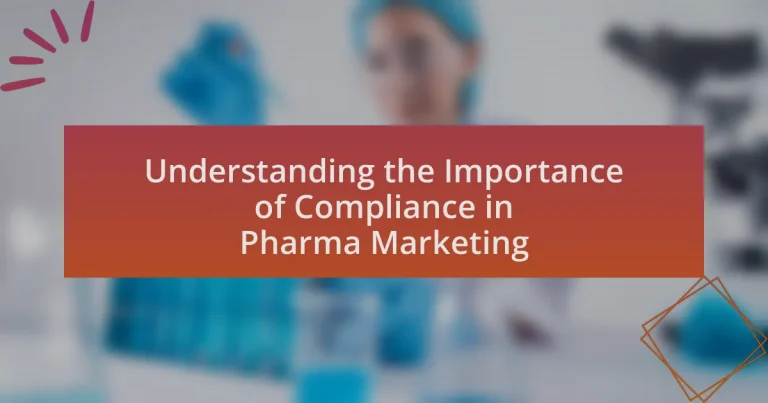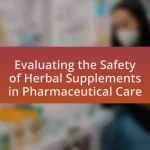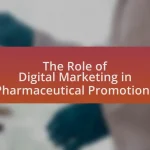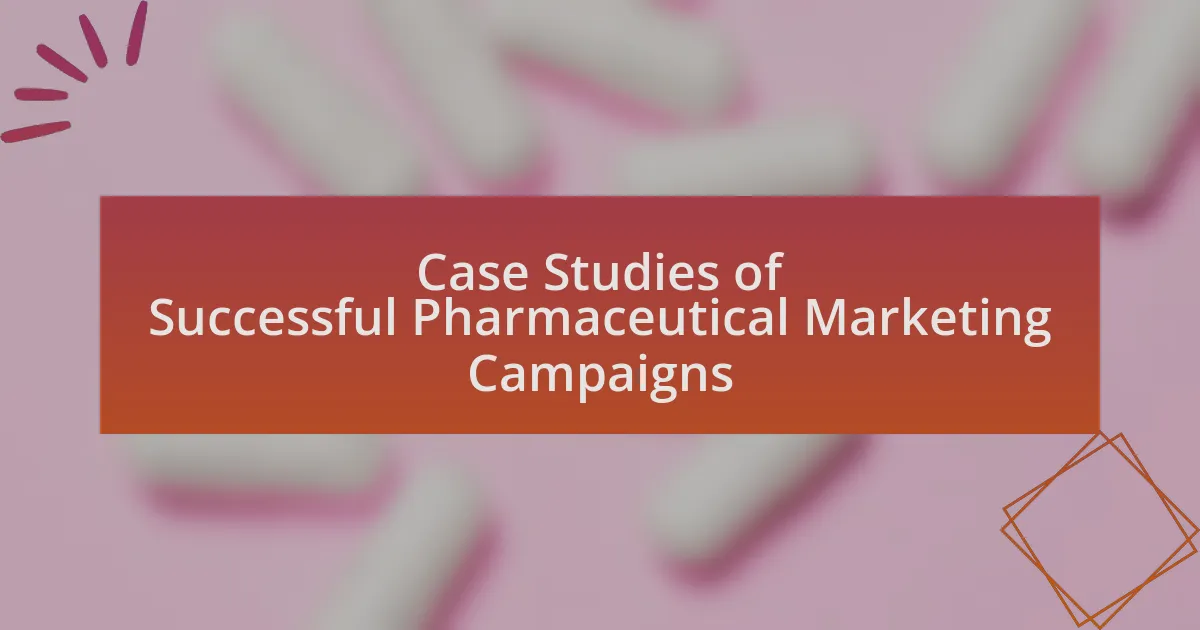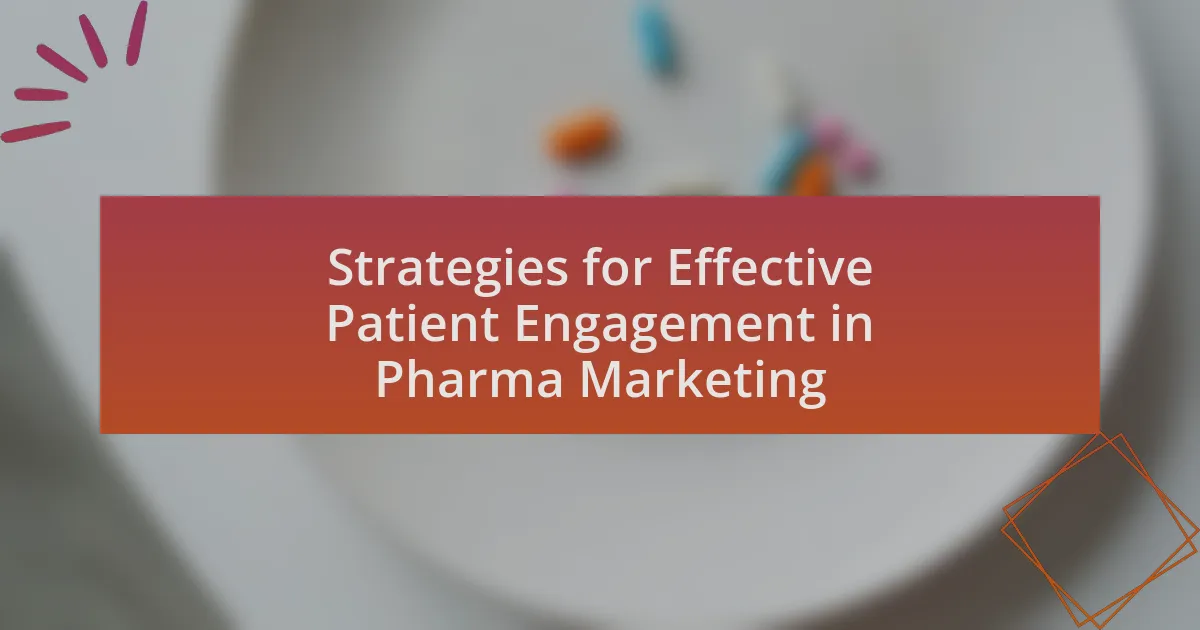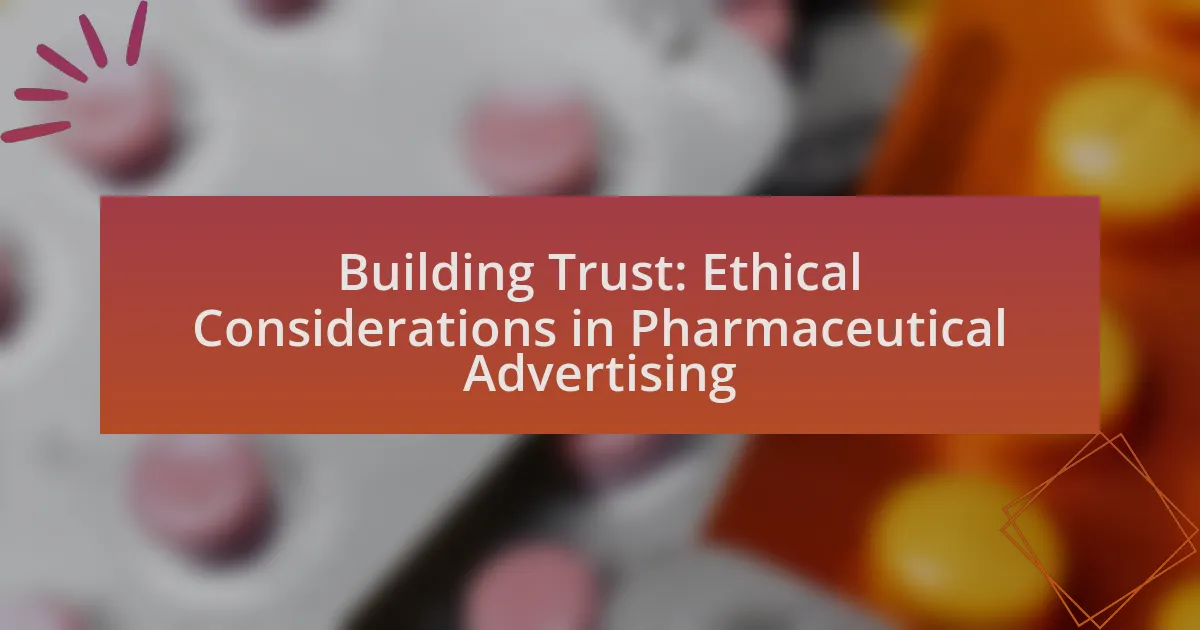Compliance in pharma marketing is the adherence to laws, regulations, and ethical standards that govern the promotion of pharmaceutical products, primarily enforced by regulatory bodies such as the FDA and EMA. This article outlines the critical importance of compliance in ensuring patient safety, maintaining public trust, and avoiding legal penalties. It discusses the legal frameworks that govern compliance, the consequences of non-compliance, and the impact on marketing strategies. Additionally, it highlights best practices for implementing effective compliance programs, the role of technology, and the significance of leadership in fostering a culture of compliance within pharmaceutical companies.
What is Compliance in Pharma Marketing?
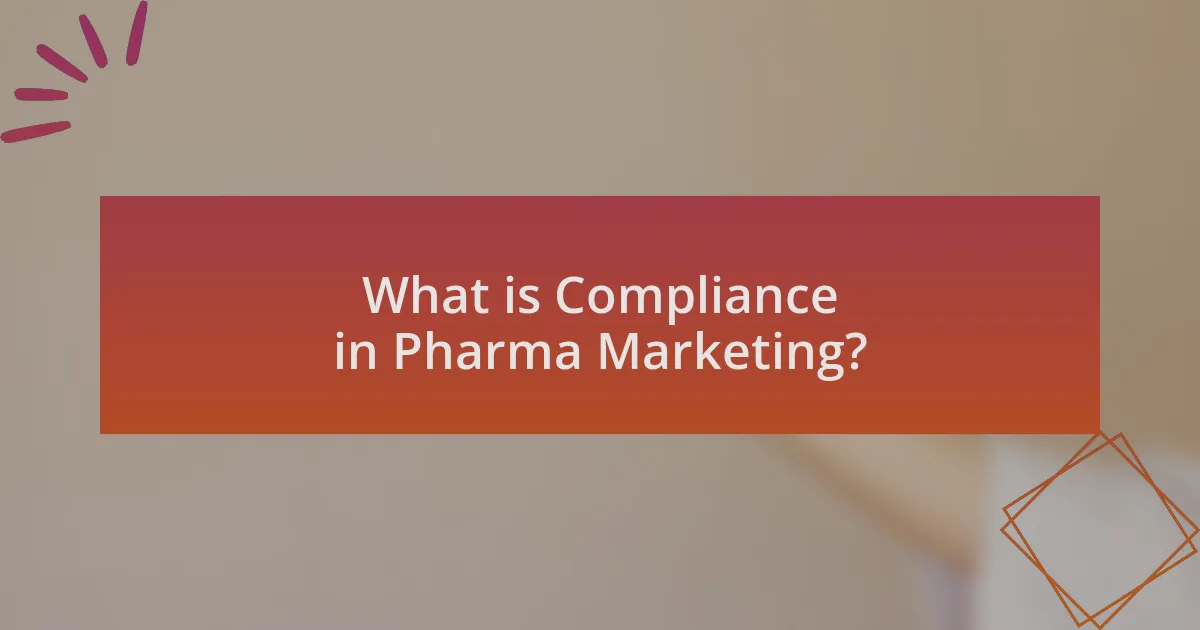
Compliance in pharma marketing refers to the adherence to laws, regulations, and ethical standards governing the promotion of pharmaceutical products. This includes following guidelines set by regulatory bodies such as the Food and Drug Administration (FDA) in the United States and the European Medicines Agency (EMA) in Europe, which dictate how drugs can be marketed, the information that must be disclosed, and the interactions with healthcare professionals. Compliance ensures that marketing practices are truthful, not misleading, and that they prioritize patient safety and informed decision-making. Violations can lead to significant legal penalties, reputational damage, and loss of trust among consumers and healthcare providers.
Why is Compliance Critical in the Pharmaceutical Industry?
Compliance is critical in the pharmaceutical industry to ensure patient safety and maintain public trust. Regulatory bodies, such as the FDA, enforce strict guidelines that govern drug development, marketing, and distribution to prevent harmful practices and ensure that medications are safe and effective. Non-compliance can lead to severe consequences, including legal penalties, product recalls, and damage to a company’s reputation. For instance, the FDA reported that in 2020, it issued over 50 warning letters to pharmaceutical companies for violations related to marketing practices, underscoring the importance of adherence to compliance standards.
What are the legal frameworks governing pharma marketing compliance?
The legal frameworks governing pharma marketing compliance include the Food, Drug, and Cosmetic Act (FDCA), the Drug Enforcement Administration (DEA) regulations, and the Federal Trade Commission (FTC) guidelines. The FDCA establishes the standards for drug marketing and advertising, ensuring that claims are truthful and not misleading. The DEA regulates the marketing of controlled substances, requiring compliance with specific advertising rules. Additionally, the FTC enforces laws against deceptive advertising practices, which apply to pharmaceutical marketing as well. These frameworks collectively ensure that pharmaceutical companies adhere to ethical standards and legal requirements in their marketing practices.
How do compliance regulations differ across regions?
Compliance regulations differ significantly across regions due to varying legal frameworks, cultural norms, and industry standards. For instance, the United States enforces strict regulations through the Food and Drug Administration (FDA) and the Federal Trade Commission (FTC), focusing on transparency and consumer protection, while the European Union adheres to the General Data Protection Regulation (GDPR), emphasizing data privacy and consent. In contrast, countries in Asia may have less stringent regulations, leading to diverse compliance practices. These differences can impact pharmaceutical marketing strategies, requiring companies to adapt their approaches based on regional requirements to avoid legal repercussions and ensure ethical practices.
What are the Consequences of Non-Compliance?
The consequences of non-compliance in pharma marketing include legal penalties, financial losses, and reputational damage. Legal penalties can arise from violations of regulations such as the FDA guidelines, leading to fines that can reach millions of dollars. Financial losses may occur due to the withdrawal of products from the market or increased scrutiny from regulatory bodies, which can disrupt business operations. Reputational damage can result in loss of trust from healthcare professionals and patients, ultimately affecting market share and long-term profitability. For instance, a study by the Pharmaceutical Research and Manufacturers of America indicates that companies facing compliance issues often experience a significant decline in stock prices and investor confidence.
What legal penalties can companies face for non-compliance?
Companies can face significant legal penalties for non-compliance, including fines, sanctions, and criminal charges. For instance, under the False Claims Act, companies can incur penalties ranging from $5,500 to $11,000 per violation, along with treble damages. Additionally, regulatory bodies like the FDA can impose civil monetary penalties and revoke licenses, impacting a company’s ability to operate. In severe cases, executives may face imprisonment for fraudulent activities, as seen in high-profile cases within the pharmaceutical industry. These penalties underscore the critical importance of compliance in pharma marketing to avoid legal repercussions and maintain operational integrity.
How does non-compliance impact a company’s reputation?
Non-compliance significantly damages a company’s reputation by eroding trust among stakeholders, including customers, investors, and regulatory bodies. When a company fails to adhere to legal and ethical standards, it can lead to negative publicity, loss of customer loyalty, and potential legal repercussions. For instance, a study by the Ethics & Compliance Initiative found that organizations with strong compliance programs experience 50% fewer incidents of misconduct, highlighting the correlation between compliance and reputation. Furthermore, companies like Volkswagen faced severe reputational damage and financial losses due to non-compliance with emissions regulations, illustrating the long-term impact of such failures on public perception and market position.
How Does Compliance Affect Pharma Marketing Strategies?
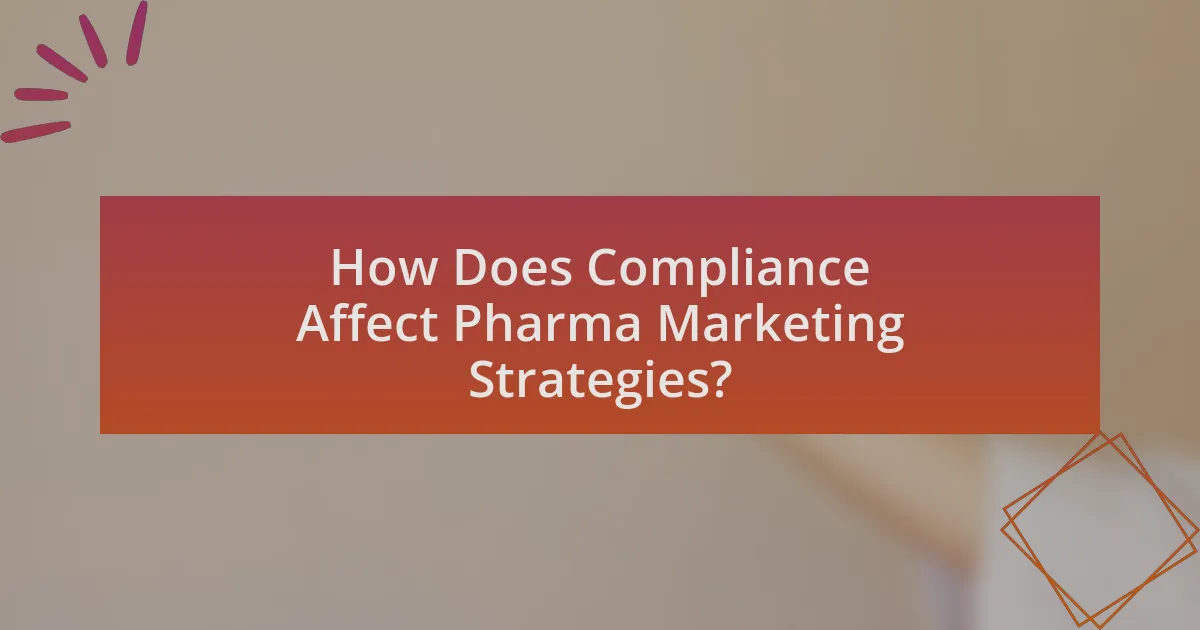
Compliance significantly shapes pharma marketing strategies by dictating the legal and ethical boundaries within which pharmaceutical companies must operate. Regulatory frameworks, such as the FDA guidelines in the United States and the EMA regulations in Europe, require that marketing materials are truthful, not misleading, and substantiated by scientific evidence. This necessitates a careful approach to messaging, targeting, and promotional tactics, ensuring that all claims about drug efficacy and safety are backed by clinical data.
For instance, a study published in the Journal of Pharmaceutical Marketing & Management highlights that companies adhering to compliance regulations not only avoid legal repercussions but also build trust with healthcare professionals and patients, ultimately enhancing brand reputation. Thus, compliance is not merely a legal obligation; it is a strategic imperative that influences how pharmaceutical companies communicate their products to the market.
What are the key components of a compliant marketing strategy?
The key components of a compliant marketing strategy include adherence to regulatory guidelines, transparency in communication, and ethical promotion practices. Regulatory guidelines, such as those set by the FDA and other governing bodies, dictate how pharmaceutical products can be marketed, ensuring that claims are substantiated and not misleading. Transparency in communication involves providing clear and accurate information about products, including potential risks and benefits, which fosters trust with healthcare professionals and patients. Ethical promotion practices ensure that marketing efforts do not exploit vulnerable populations or misrepresent the product’s efficacy. These components are essential for maintaining compliance and protecting the integrity of the pharmaceutical industry.
How can companies ensure transparency in their marketing practices?
Companies can ensure transparency in their marketing practices by adhering to strict regulatory guidelines and maintaining open communication with stakeholders. Compliance with regulations such as the FDA’s guidelines for pharmaceutical advertising ensures that marketing messages are truthful and not misleading. Additionally, companies can implement clear disclosure policies regarding the funding of research, sponsorships, and potential conflicts of interest. For instance, the Pharmaceutical Research and Manufacturers of America (PhRMA) Code emphasizes the importance of transparency in interactions with healthcare professionals. By following these practices, companies can build trust and credibility with their audience while minimizing the risk of legal repercussions.
What role does data privacy play in compliance?
Data privacy is essential for compliance as it ensures that organizations adhere to legal and regulatory requirements regarding the handling of personal information. In the pharmaceutical industry, compliance with data privacy laws, such as the General Data Protection Regulation (GDPR) and the Health Insurance Portability and Accountability Act (HIPAA), is critical to protect patient data and maintain trust. Violations of these regulations can lead to significant penalties, including fines and legal action, which underscores the importance of implementing robust data privacy measures to safeguard sensitive information.
How can companies stay updated on compliance regulations?
Companies can stay updated on compliance regulations by regularly monitoring regulatory agency announcements and subscribing to industry newsletters. Regulatory agencies, such as the FDA and EMA, frequently publish updates on compliance requirements, which are essential for companies in the pharmaceutical sector to follow. Additionally, industry associations often provide resources and updates on changes in regulations, helping companies remain informed. Engaging with legal experts and compliance consultants can also ensure that companies are aware of the latest regulatory changes and best practices.
What resources are available for tracking compliance changes?
Resources available for tracking compliance changes include regulatory databases, compliance management software, and industry-specific publications. Regulatory databases, such as the FDA’s website, provide updates on new regulations and compliance guidelines. Compliance management software, like Veeva Vault or MasterControl, offers tools for monitoring compliance status and changes in real-time. Industry-specific publications, such as the Journal of Pharmaceutical Sciences, frequently publish articles on compliance trends and updates, ensuring that professionals stay informed about the latest developments in pharma marketing compliance.
How can training programs enhance compliance awareness among employees?
Training programs enhance compliance awareness among employees by providing structured education on regulatory requirements and ethical standards specific to the pharmaceutical industry. These programs equip employees with the knowledge necessary to understand compliance obligations, thereby reducing the risk of violations. Research indicates that organizations with comprehensive training programs experience a 50% reduction in compliance-related incidents, demonstrating the effectiveness of targeted education in fostering a culture of compliance.
What Best Practices Should Pharma Companies Follow for Compliance?
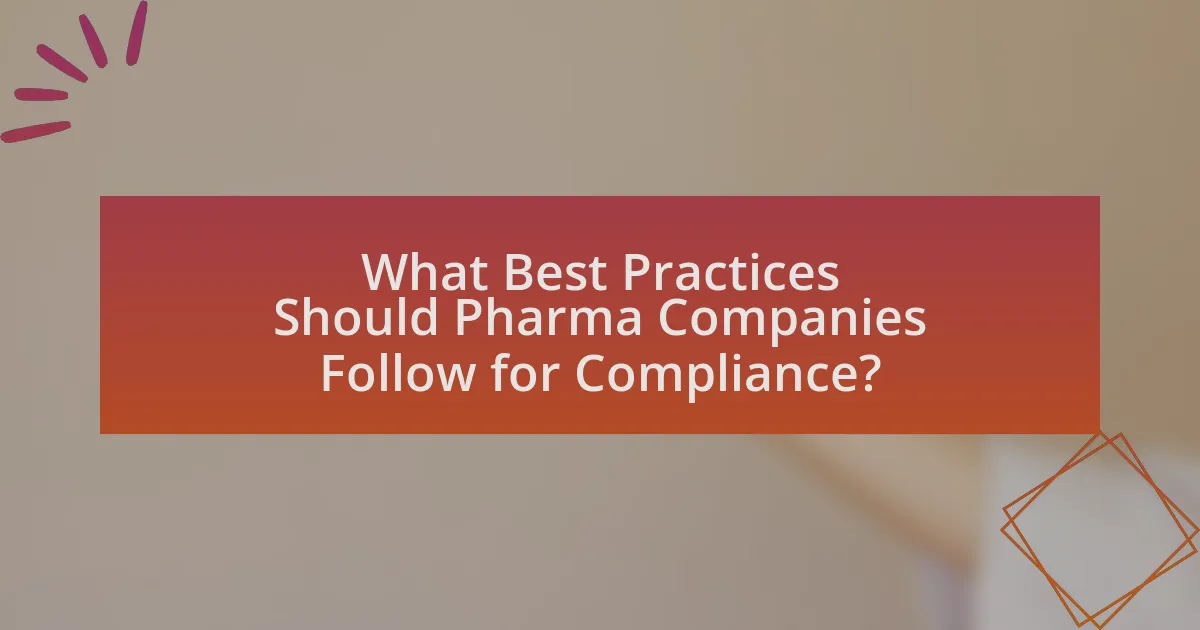
Pharma companies should follow best practices such as implementing robust compliance programs, conducting regular training for employees, and ensuring transparency in marketing practices. A strong compliance program includes clear policies and procedures that align with regulatory requirements, such as those set by the FDA and EMA. Regular training ensures that employees are aware of compliance obligations and ethical standards, which is crucial given that 70% of compliance failures stem from employee misconduct. Transparency in marketing practices, including accurate representation of drug benefits and risks, helps maintain trust and adheres to guidelines established by organizations like the PhRMA Code. These practices collectively enhance compliance and mitigate risks associated with regulatory violations.
How can companies implement effective compliance programs?
Companies can implement effective compliance programs by establishing clear policies, providing comprehensive training, and conducting regular audits. Clear policies outline the standards and expectations for compliance, ensuring that all employees understand their responsibilities. Comprehensive training equips employees with the knowledge to recognize compliance issues and adhere to regulations. Regular audits assess the effectiveness of the compliance program, identify areas for improvement, and ensure ongoing adherence to legal and ethical standards. These steps are essential for mitigating risks and fostering a culture of compliance within the organization.
What are the essential elements of a compliance program?
The essential elements of a compliance program include a code of conduct, risk assessment, training and education, monitoring and auditing, reporting mechanisms, and enforcement and discipline. A code of conduct establishes the ethical standards and expectations for behavior within the organization. Risk assessment identifies potential compliance risks specific to the pharmaceutical industry, allowing for targeted strategies. Training and education ensure that employees understand compliance requirements and their responsibilities. Monitoring and auditing involve regular reviews of compliance practices to detect and address issues proactively. Reporting mechanisms provide safe channels for employees to report concerns without fear of retaliation. Finally, enforcement and discipline ensure that violations are addressed consistently and fairly, reinforcing the importance of compliance. These elements collectively contribute to a robust compliance framework that mitigates risks and promotes ethical practices in pharma marketing.
How can technology aid in maintaining compliance?
Technology aids in maintaining compliance by automating regulatory processes and ensuring accurate data management. Automated systems can track changes in regulations, alerting organizations to necessary updates, which minimizes the risk of non-compliance. For instance, compliance management software can streamline documentation and reporting, making it easier to adhere to industry standards. According to a study by the Compliance, Governance and Oversight Council, organizations that implement technology solutions for compliance see a 30% reduction in compliance-related errors. This demonstrates that technology not only enhances efficiency but also significantly improves adherence to compliance requirements in the pharmaceutical marketing sector.
What are common challenges in achieving compliance?
Common challenges in achieving compliance include navigating complex regulations, ensuring consistent training for employees, and managing the evolving nature of compliance requirements. The pharmaceutical industry faces intricate regulations from entities like the FDA and EMA, which can vary by region and change frequently, complicating adherence. Additionally, organizations often struggle to provide ongoing training that keeps all employees informed about compliance standards, leading to potential lapses in adherence. Furthermore, the dynamic landscape of compliance, influenced by new laws and technological advancements, requires continuous monitoring and adaptation, making it difficult for companies to maintain consistent compliance.
How can companies overcome barriers to compliance?
Companies can overcome barriers to compliance by implementing comprehensive training programs and establishing clear communication channels. Training programs educate employees about regulatory requirements and best practices, which enhances understanding and adherence to compliance standards. For instance, a study by the Compliance and Ethics Institute found that organizations with robust training initiatives saw a 30% reduction in compliance violations. Additionally, fostering open communication allows employees to report concerns and seek guidance, which further strengthens compliance culture. By prioritizing education and communication, companies can effectively navigate and mitigate compliance challenges in the pharmaceutical marketing sector.
What role does leadership play in fostering a culture of compliance?
Leadership plays a critical role in fostering a culture of compliance by setting the tone at the top and modeling ethical behavior. Effective leaders communicate the importance of compliance through clear policies, regular training, and open dialogue, which reinforces the organization’s commitment to ethical practices. Research indicates that organizations with strong leadership support for compliance initiatives experience fewer violations and enhanced employee engagement, as leaders who prioritize compliance create an environment where employees feel empowered to report unethical behavior without fear of retaliation.
What practical tips can enhance compliance in pharma marketing?
To enhance compliance in pharma marketing, companies should implement robust training programs for employees on regulatory requirements and ethical standards. These training programs ensure that all staff members are well-informed about the legal frameworks governing pharmaceutical marketing, such as the FDA regulations and the PhRMA Code. Regular audits and monitoring of marketing practices can further reinforce compliance by identifying potential violations before they occur. Additionally, establishing clear communication channels for reporting compliance concerns encourages a culture of transparency and accountability. Research indicates that organizations with strong compliance programs experience fewer regulatory violations, which supports the effectiveness of these practical tips.
